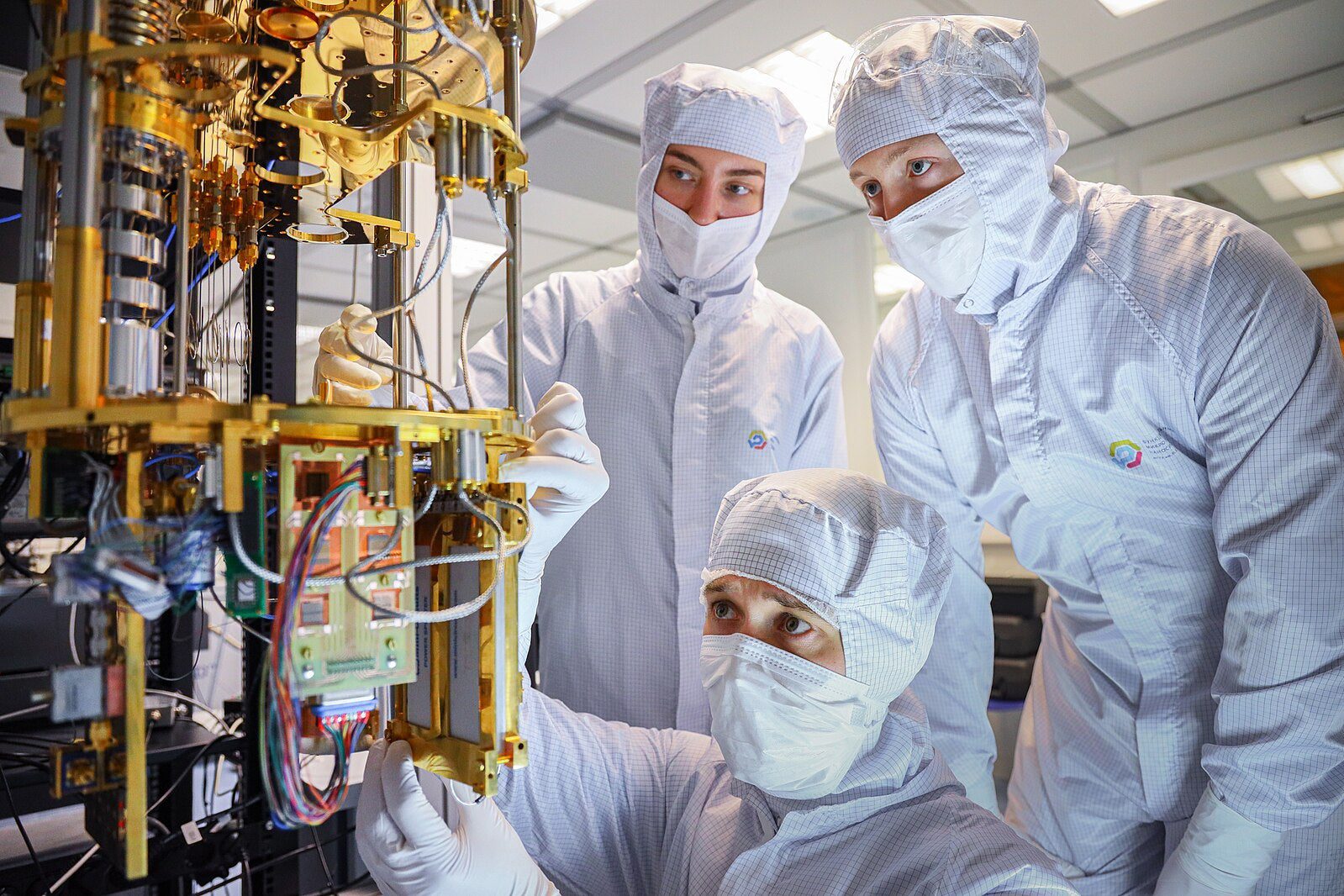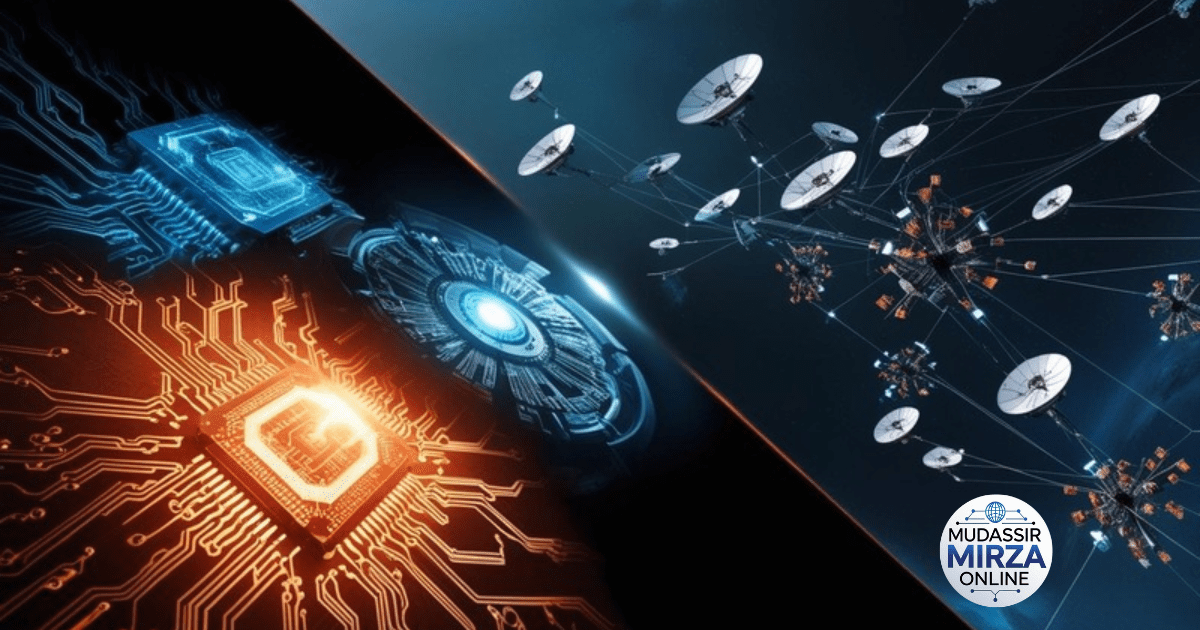Quantum Computers vs. Satellite Security:The Looming Encryption Threat
What Are Quantum Computers, and Why Do They Matter?
In a world increasingly dependent on space-based systems, the growing power of quantum computers poses a serious threat to satellite security. These advanced machines, based on quantum physics principles, could soon render current encryption codes useless, exposing sensitive data and critical infrastructure to unprecedented cybersecurity threats.
Satellites control everything from GPS and communications to military surveillance, and most are protected by outdated digital locks that quantum systems could break with ease. This looming danger, known as the quantum computing threat, is not just theoretical—it’s a ticking clock. To protect national interests and maintain global stability, experts urge swift action to develop quantum-resistant security systems and reimagine how we defend the skies above.
Satellites help humans connect with each other and with the cosmos. Scientists are attempting to ramp up the power of satellites through quantum computers. But this type of computer can also create chaos on Earth. Credit: ESA
How Quantum Computers Threaten Satellite Security
Today, satellites are the backbone of modern life. They help us with navigation, weather tracking, military defense, and even emergency satellite communication. These orbital infrastructure systems are protected by encryption codes like RSA and ECC. But there’s a problem.
Quantum computers can easily crack these codes. Once that happens, satellite hacking becomes possible. A hacker using a powerful quantum computer could intercept messages or even take control of entire satellite swarms. That’s why experts warn of growing cybersecurity threats and cryptographic vulnerability in space.
The Race Against Quantum Time: When Will It Happen?
We are not there yet. But we are close. IBM, Google, and China are racing to build quantum computers that can break current encryption. Experts call this the 2035 migration deadline. By then, or even sooner, quantum decryption could be a reality.
This is a major warning sign. Organizations around the world are now making a roadmap to quantum-safe systems. They aim to beat the clock. The timeline for quantum readiness is short. Once quantum computers break digital codes, there’s no turning back.

Why Satellites Are More Vulnerable Than You Think
Many satellites in orbit today are old. These legacy satellite systems were launched before we knew about the quantum computing threat. That means they still use weak encryption. And here’s the problem—updating security in orbit is nearly impossible.
Also, many satellites work together. This system, called satellite swarms, makes one weak satellite a danger to all. Just like a weak link in a chain, one vulnerable satellite can risk the whole network. This makes secure satellite systems a top priority.
What Is Post-Quantum Cryptography (PQC)?
To stop this threat, experts are building a new kind of defense. It’s called post-quantum cryptography. These are new quantum-safe encryption methods that even the best quantum computers can’t break.
The U.S. National Institute of Standards and Technology (NIST) is leading the charge. You can read more about their work here. Their job is to pick the best encryption tools for the future. This is part of how governments adopting new cryptography are fighting back.
Building Tomorrow’s Security Today
The best time to build a firewall is before the fire starts. That’s why engineers are already working on new hardware, software, and quantum-resistant security systems. This includes better chips, stronger communication links, and future-proofing satellite technology.
The U.S. government, NASA, and DARPA are investing in secure space tech. These teams are creating digital infrastructure that can handle tomorrow’s attacks. The goal? Upgrade satellites for future threats before it’s too late.
Key Takeaways for Cybersecurity Experts and Engineers
Quantum risk preparedness is more than just tech. It’s about planning, training, and acting fast. Experts must review old systems, find weak spots, and move to post-quantum cryptography before attackers do.
Here’s a checklist of actions:
| Action Step | Why It Matters |
|---|---|
| System audit | Finds weak encryption codes |
| Key rotation plan | Stops stolen keys from being reused |
| Software patch updates | Makes satellite security more flexible |
| Training engineers | Builds teams for secure satellite systems |
| PQC integration timeline | Helps with preparing for the quantum age |
Staying Ahead of the Curve: International Response and Regulations
The global cybersecurity efforts are moving fast. The U.S. leads in many ways. But Europe, China, and Japan are not far behind. Each is creating plans to switch to quantum-resistant security systems.
A good example is the U.K.’s roadmap to quantum safety. They’ve committed to updating all public encryption by 2035. This global push shows that collaborating for cybersecurity is no longer optional—it’s survival.
The Quantum Apocalypse or a Manageable Shift?
Some people call this the quantum apocalypse. That’s extreme. But the danger is real. Still, with fast action, global teamwork, and new tech like post-quantum cryptography, this can be a manageable shift.
We’re not helpless. But waiting will only make it worse. The truth is: satellite encryption is one of the biggest national security risks of our time. And the quantum computing threat is coming fast.
Final Thoughts and Call to Action
Quantum computers are coming. The question is: will we be ready? With stronger digital infrastructure, secure satellite systems, and better post-quantum cryptography, we can be. But only if we act now.
Are your systems future-proof? Let’s start talking. Share this article, comment below, and help others understand the stakes. The sky isn’t falling yet—but it might, if we don’t secure it.
FAQs – Quantum Computers vs. Satellite Security
Can a quantum computer crack passwords?
Yes, powerful quantum computers could potentially crack complex passwords much faster than traditional computers using advanced algorithms like Grover’s.
Will quantum computers break cybersecurity?
They won’t break all of cybersecurity, but they threaten many encryption-based systems, requiring new quantum-resistant security methods.
Can a quantum computer break encryption?
Yes, quantum computers can break current encryption codes like RSA and ECC by using Shor’s algorithm to solve their mathematical problems quickly.
How long would it take a quantum computer to crack encryption?
A sufficiently powerful quantum computer could crack RSA-2048 encryption in hours—or even minutes—once large-scale quantum hardware becomes available.
Can quantum computers break AES 256 encryption?
AES-256 is more resistant but quantum computers could still weaken it; Grover’s algorithm could reduce its strength to the equivalent of AES-128.
Read our previous article: Foods That Can Ruin Your Cast-Iron Skillet
